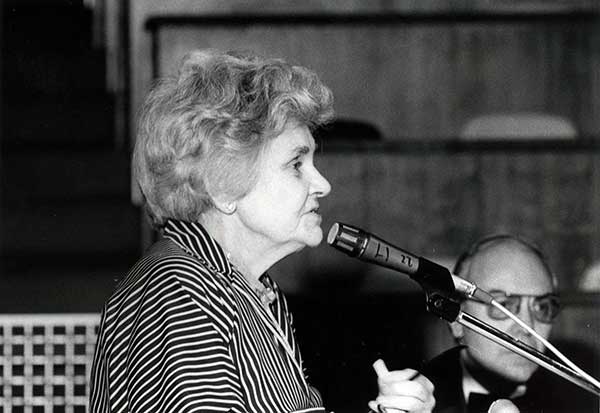
“More can be learned about how to write poetry from Elizabeth Bishop than from reading the writings of most other poets.”—Jerome Mazzaro, “Elizabeth Bishop’s Particulars” (WLT 51, Winter 1977)
Elizabeth Bishop (1911–1979) was born in Worcester, Massachusetts. Her father died when she was very young, and as a result of the heartbreak, her mother was committed to an institution in 1916. Bishop never reunited with her mother and was subsequently raised by her grandparents. Though she dabbled with poetry while in school, Bishop left home to study music composition at Vassar College in 1929. After suffering a bout of stage fright, she changed her focus to English literature. Following her graduation from college, Bishop spent the rest of her life traveling, writing poetry, and teaching at various colleges around the United States. Her body of work includes the poetry collections North & South (1946), A Cold Spring (1956), and Farrar, Straus, and Giroux’s “definitive edition,” Poems (2011). Her correspondence with close friends and her partner, Alice Methfessel, appear in many recent publications. In addition to the 1976 Neustadt Prize, Bishop was honored with the American Academy of Arts and Letters Award in 1950, the Pulitzer Prize for Poetry in 1956, and the National Book Award for Poetry in 1970. From 1949 to 1950 she served as Poet Laureate of the United States.
“The body of her work is relatively small, yet one cannot read a single line either of her poetry or prose without feeling that a real poet is speaking,” said nominating author Marie-Claire Blais in her presentation of Bishop to the Neustadt jurors. “Some poets turn their struggle to rage and hate, but she has arrived at a kind of pure nostalgia that is both past and present and at the peace ‘beneath’ and ‘within’ (but not necessarily ‘with’) which I consider essential to great poetry” (WLT 51, Winter 1977).
1976 Neustadt Jurors and Finalists |
||||
|---|---|---|---|---|
| JURORS | FINALISTS | |||
| Melih Cevdet Anday (Turkey) | Yannis Ritsos (Greece) | |||
| John Ashbery (USA) | Elizabeth Bishop (USA) | |||
| Agustí Bartra (Spain) | Anaïs Nin (USA) | |||
| H. C. ten Berge (The Netherlands) | Bert Schierbeek (The Netherlands) | |||
| Marie-Claire Blais (Canada) | Elizabeth Bishop (USA) | |||
| Paal Brekke (Norway) | Andrei Voznesensky (USSR) | |||
| Dennis Brutus (South Africa) | Wole Soyinka (Nigeria) | |||
| Mohammed Dib (Algeria) | Tawfiq al-Hakim (Egypt) | |||
| Zbigniew Herbert (Poland) | Czesław Miłosz (Poland) | |||
| Thomas Kinsella (Ireland) | Robert Lowell (USA) | |||
| Günter Kunert (East Germany) | Tadeusz Rózewicz (Poland) | |||
“Mr. Ivask has selected a poem called ‘Sandpiper’ to be printed on the program today, and when I saw that poem, rather old now, I began to think: Yes, all my life I have lived and behaved very much like that sandpiper—just running along the edges of different countries and continents, ‘looking for something.’”
—Elizabeth Bishop (United States), 1976 Neustadt Laureate
“What one seems to want in art, in experiencing it, is the same thing that is necessary for its creation, a self-forgetful, perfectly useless concentration.”
—Elizabeth Bishop (United States), 1976 Neustadt Laureate

